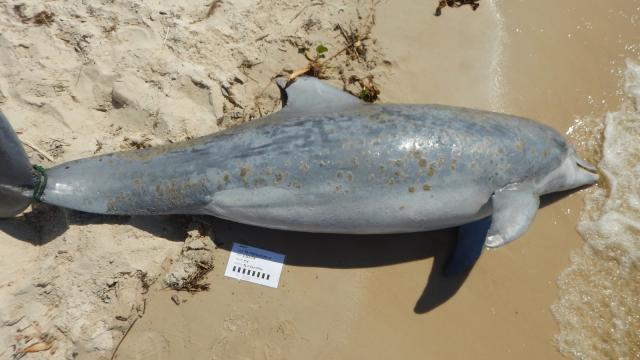Since the beginning of February, over 260 bottlenose dolphin strandings have been documented along the northern Gulf Coast, prompting the declaration of an “unusual mortality event”. The reason for the strandings isn’t entirely clear, but indications point to excessive freshwater from rain — and even the Deepwater Horizon Oil Spill, which has comprised dolphin health.
The unusual mortality event, or UME, was declared this week by the US National Oceanic and Atmospheric Administration (NOAA). Since 1 February 2019, a total of 261 strandings of the common bottlenose dolphin (Tursiops truncatus) have been detected in a Gulf Coast region stretching from the Florida Panhandle through to Louisiana. The strandings were particularly high in April and May.
At a news conference held this week, NOAA Fisheries Southeast Region Marine Mammal Stranding Program Administrator Erin Fougères said 121 strandings were documented in Mississippi, 89 in Louisiana, 32 in Alabama and 37 in Florida, as reported in NOLA.
The rate of these strandings is three times higher than normal, prompting NOAA to declare the UME, which is defined under the Marine Mammal Protection Act as “a stranding event that is unexpected, involves a significant die-off of any marine mammal population, and demands immediate response”.
The cause of the strandings is yet to be determined. Many of the stranded dolphins were badly decomposed, which has limited the ability of investigators to determine the cause of death. Samples are currently being collected for further analysis. That said, NOAA said many of the dead dolphins exhibited skin lesions consistent with prolonged exposure to freshwater.
That excessive freshwater may be killing these dolphins is a distinct possibility, given that it’s been an especially wet year, and freshwater from rain and melting snow has been pouring into bays, sounds and estuaries along the Gulf Coast. Dolphins along the Gulf Coast are exposed to low-salinity waters each spring, but this season has been particularly bad, according to NOAA.
For dolphins, too much freshwater can result in skin lesions, abnormal blood chemistry, eye disorders and sometimes death, according to a NOAA question-and-answer sheet. These health impacts can occur over a period of days to weeks, and these conditions “can be exacerbated in dolphins with pre-existing conditions, such as injuries, infections, poor nutrition or immune suppression,” said NOAA.
Upsettingly, some of these “pre-existing conditions” might be traced back to the 2010 Deepwater Horizon Oil spill. Even nine years after this event, bottlenose dolphins in the region still exhibit health problems such as adrenal and lung disease, high rates of blood disorders, and “overall poor body condition,” according to NOAA.
An investigative team is now collaborating with the Working Group on Marine Mammal Unusual Mortality Events to review the collected evidence and to help steer the investigation.
Practically nothing can be done to alleviate the excessive rainfall, what NOAA described as a “natural event”. But the investigation will also take a look at potential human factors, including the opening of spillways for flood-control purposes. The Bonnet-Carre spillway, for example, was open for 76 days between January and June, and like other spillways, it “will be investigated as a potential contributing factor to this UME,” noted NOAA.
As a final aside, it isn’t unreasonable to ask why dolphins don’t just swim away from low-salinity waters. But as NOAA pointed out, dolphins exhibit strong, life-long attachment to small swaths of territory, and they’re reluctant to leave their home range even when environmental disruptions — such as an oil spill — threaten their health.
